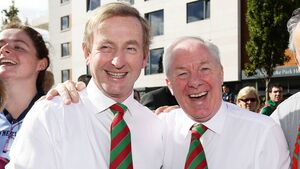There are no safe Dáil seats in Mayo anymore

For the first time since 1951, there won't be a Kenny or a Ring on the ballot paper in a general election in Mayo. Picture: INPHO/Cathal Noonan
At last – an election date has been confirmed.
For weeks it was inevitable we would be looking at a late November election. The only question was whether it would be November 22 or 29 and now Taoiseach Simon Harris has confirmed it is the last Friday of the month.
His timing was curious – announcing it the day Donald Trump was past the post in the US Presidential Election.
Governments are often accused of releasing potentially damaging news at the most opportune time for it to get as little traction as possible. The Friday of a bank holiday weekend, the day bigger news arrives, etc.
Declaring the election the same day Trump was returned to power might nearly make you think the Taoiseach doesn’t want people to know about the election.
But let’s hope the parallels with the US election end there. The division that has torn the US apart from the inside is sobering. The name-calling and abuse towards the opposition, particularly from the Trump campaign, was nauseating. Why has everything become so personal? Are people racing to be the so-called leader of the free world not able to rise above personal insults and focus on policy?
Thankfully such rancour is not a staple of the Irish political diet yet. But it could easily turn that way. We’re seeing plenty of it online and from candidates on either end of the ideological extremes, particularly on the right.
It is possible to vehemently oppose a political position without being personal or nasty.
One reason why this election might not degenerate like the US is the likely lack of a serious contest. It appears a foregone conclusion that Fianna Fáil and Fine Gael will stay in power. The only question is whether they will have the numbers to do it without third-party support or whether they will need the likes of Labour, the Social Democrats, a coterie of Independents or perhaps even their current coalition partners, the Greens, if they can survive their typical post-Government electoral apocalypse.
Sure, there will be sub-plots. Which party will have the largest share? How will Sinn Féin fare four years after such an impressive display? What level of traction will right-wing candidates get?
But most of the drama will focus on individual seat battles rather than who will be in Government, barring an absolute meltdown for Fine Gael and Fianna Fáil.
We’re lucky that we’ve plenty of intrigue in Mayo to keep us entertained. Of course, elections should be more important than just entertainment, but they are the most fascinating of blood sports.
Political careers live and die by the electorate. Strong national performers might struggle locally. Despite their high profiles, Leo Varadkar and Simon Harris, the last two Fine Gael Taoisigh, have been far from exceptional vote-getters in their own constituencies.
Mayo has a habit of ousting outgoing TDs. Lisa Chambers, Michelle Mulherin, Jerry Cowley, John Carty, Tom Moffatt and Jim Higgins have all lost their seats in Mayo since the turn of the millennium.
The fact that there are only three outgoing TDs standing in what is a five-seat Mayo constituency should stand to Deputies Calleary, Conway-Walsh and Dillon but there is no banker in this election.
It is the first election since 1951 – Mayo GAA jokes at the ready – without either a Kenny, Ring or Flynn running.
Michael Ring used to get fiercely animated about being described as having a ‘safe’ seat, that such talk could lead to thousands of voters giving their first preference elsewhere to someone more in need of it. Of course that never happened, Ring’s seat was the epitome of safe.
No candidate can sleep soundly thinking they have a safe seat in Mayo now. What initially looked a weak enough field has become very strong in recent weeks.
Issues do not always dominate elections in Mayo; personalities often do. But what are the issues that will feed into decision-making in Mayo?
National issues keenly felt on the ground locally such as housing and health will be a factor. Concerns over Mayo University Hospital have attracted plenty of attention. Housing prices are lower in the west than elsewhere but that’s of scant comfort for those on social housing waiting lists for years and years. We’re a wealthy country but successive governments have continuously failed to get on top of these two issues.
Immigration is a divisive and emotive issue, and Donald Trump has demonstrated the political capital that can be gained from baiting voters over this issue. In Ireland, there has been a lot of scaremongering, and there can be no doubt that state inefficiencies, evidenced in every department, are a factor here. But the ignorance online is at odds with the reality on the ground. It is an issue but one which has been distorted.
In Mayo, infrastructure has always been an issue and it is hard to imagine when it will not be a major ticket item.
The reopening of the Western Rail Corridor to Claremorris needs to be a priority and attention then needs to switch to its extension to Sligo. The N17 needs urgent attention as does large sections of the N5. Despite the great work being done by Local Link in isolated communities, better public transport services are still needed.
And our rural towns and villages need a viable future. They need employment, they need young families and they need all the services required. Far too many parts of north and east Mayo are in decline, left to starve on crumbs while Castlebar, Westport and south Mayo do better because of the employment advantages and greater proximity to Galway.
There needs to be a transformation in mindsets for Mayo to realise its potential. Candidates who will fight the county’s and region’s corner are more vital than ever.





